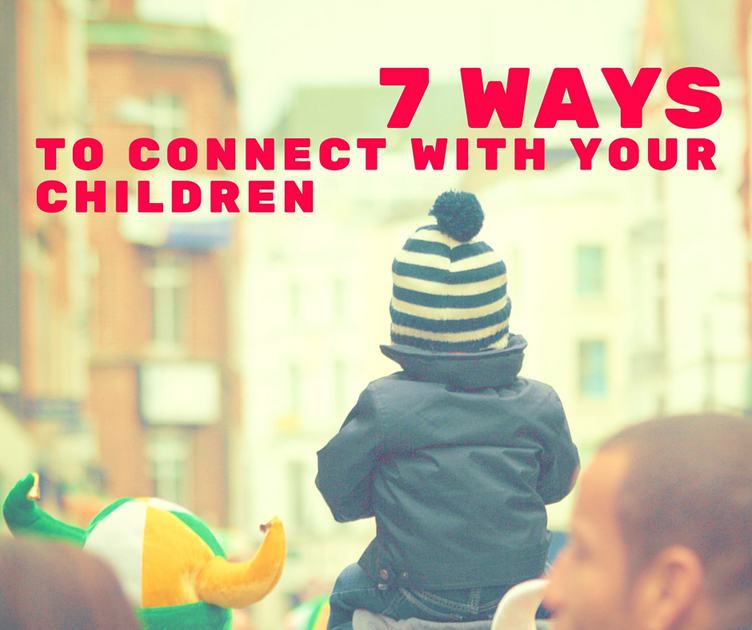
All parents worry from time to time that they’re not connecting with their children the way or as often as they would like. You might start to worry you don’t know your kids as well as you should or that they may be doing things you wouldn’t recommend; the fear can be almost paralyzing. The good news is that it is a solvable problem that isn’t even difficult. You’re already making great strides toward your goal by wanting to connect with your children. It’s essential to care about them and what goes on around them. Take time to realize you’re doing a good thing, which should help boost your confidence as a parent.
Talk (and Listen) to Them
The most basic way to connect with your children is to talk to them. Tell them about your day and ask about theirs. Try to remember everything they tell you. Children have a memory that just won’t quit sometimes and expect you to have the same. Ask your kids questions. It’s imperative for people to feel like the person they’re talking to cares about what they have to say. Asking questions about what your kids tell you proves you were listening and want to know more. Maintaining eye contact also shows that you’re being attentive. A recent study on parents and teen relationships revealed that using engaged listening techniques such as eye contact, nodding, and using specific keywords have a powerful effect on teens’ willingness to open up to their parents. Try not to expect your child to tell you everything about themselves in one sitting. It takes time to build the kind of connection you’re looking for, especially with teens and older children still feeling rebellious.
Take an Interest in their Interests
Sometimes just talking doesn’t work for all kids. They may have built up their guard too high to realize you want to help them. In this case, it may be a good idea to consider doing something else together. If your child enjoys video games, ask for the second controller and play along with them. Another idea is to help them with an art project. You can try to get involved in some way in anything they like to do. Your children may still try to shut you out occasionally, but eventually, you’ll find something to do together.
Try not to seem judgmental about their hobbies. If your kids aren’t hurting anyone, you shouldn’t be concerned. If they start to feel that you don’t appreciate what they love, they may begin to push you further away.
Invite Them Into Your World
If you can’t find common ground in the things your children like to do, maybe you should look at what you enjoy. It’s not uncommon for children to forget that parents or guardians are people too. If you’re willing to show them who you are, they may open up and do the same. You can invite your kids to one of your favorite shows or sporting events. Let them meet some of your co-workers. If your children are old enough, you can take them to the gym or your yoga class. Anything can work as long as you can get them interested.
Find a New Hobby
You may find that you have no current interests in common with your child, and that’s okay. In this case, you can talk to them about finding something new for the two of you to do together. Try to find an activity neither of you has tried, and you both find at least mildly exciting and start together. Neither of you will be the leader of this new venture because no one has more experience. At least you have a shared experience to build upon, even if both of you dislike the activity.
Guilt is Not a Weapon
Never send your children on a guilt trip. It’s a cheap trick that will only cause them to resent you in the long run. Make it clear that you want to spend time with them and get to know them, but don’t try to make your kids feel bad if it doesn’t work out right away. It may take a few tries, but don’t give up; they’ll eventually give you a chance.
There’s a Time For Friendship and a Time For Parenting
Being your child’s friend feels incredibly special and can’t be compared. However, it can be easy to take it too far. Try not to forget that you’re a guardian first. As a parent, you’re there primarily to ensure that the child in your care is safe and grows up well. It’s necessary to find a balance between parenting and friendship. You need your child to trust you enough to tell you about the things happening around them and feel safe enough to seek guidance from you.
Don’t Get Discouraged
Kids can be challenging. It may seem that no matter what you try, you still feel just as distant from them as when you started. Again, don’t give up. Your children know what you’re trying to do; on some level, they appreciate it, even if they don’t make it obvious. Start with the basics and remember that attentive listening will create more of the connection you seek. If you use the recommended methods to engage with your children, they will at least think of you when they face any struggles, and remember that at least one person cares for them. Sometimes that’s enough.

